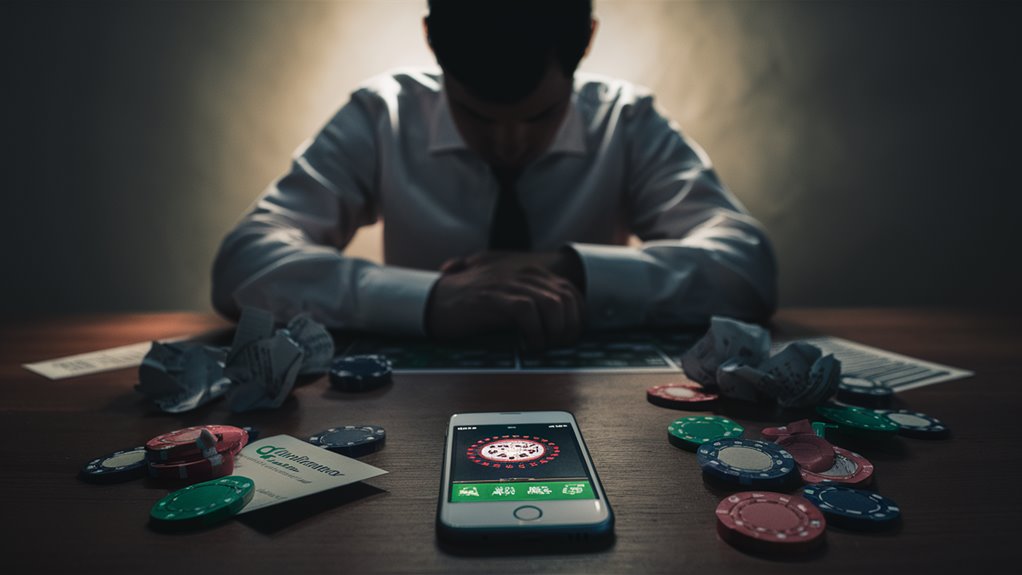
How Betting Hurts Your Mind: Risks and Help

How it Hits the Brain
Betting too much affects 1-3% of people. It alters brain pathways and damages brain connections. This addiction affects dopamine levels, similar to drug habits.
Signs and Mind Trouble
Big betting issues manifest in the following psychological signs:
- Increased anxiety and lack of tranquility
- Depression
- Sleep disturbances
- Financial stress
- Razor-Sharp Table Moves
- Mood swings
The Trouble Grows
Can’t stop betting often escalates as individuals bet more to recover losses, leading to:
- Loss of friendships
- Strained relationships
- Work-related problems
- Suicidal thoughts
How to Make It Better
Pro Help
- Cognitive behavioral therapy (CBT) and counseling
- Support groups
- Addiction treatment
- Financial advice
Help Right Now
- 24/7 helplines
- Crisis intervention
- Online support resources
- Family interventions
Ways to Stop It Before It Starts
Safe betting guidelines:
- Establish strict financial limits
- Regularly check time spent betting
- Create avoidance strategies
- Monitor mental health
Where to Find Help
Quickly access assistance through:
- Helplines
- Therapist directories
- Support meetings
- Debt management plans
About Betting Too Much
The Trouble
Betting for entertainment turns problematic when it interferes with daily life. This addiction mirrors drug habits, with increasing need, withdrawal symptoms if stopped, and persistent behavior despite negative consequences.
Signs and Risks
Main Signs
- Increasing bets for excitement
- Concealing activities
- Using betting to escape issues
- Inability to reduce betting
- Financial difficulties leading to borrowing
- Relationship challenges due to betting
How Betting Hooks You
The allure of betting affects brain and reward pathways. During betting, your brain releases dopamine, a neurotransmitter also triggered by substance use. This creates a cycle of increased risk-taking for the same pleasure.
Fixing It
Effective treatment for betting problems includes:
- Cognitive behavioral therapy (CBT) and counseling
- Support group participation
- Financial guidance
- Consultations with addiction specialists
- Family and relationship support
Early intervention with various methods significantly improves recovery outcomes.
Mind Signs in Bad Betting

Mind Signs
Betting problems often exhibit these mental signs before worsening. Key indicators include persistent financial worry, agitation when unable to bet, and withdrawal from loved ones.
Sadness and Feelings
Betting-related depression is often indicated by:
- Changes in sleep patterns
- Altered eating habits
- Lack of focus at work or home
- Suicidal ideation
- Hopelessness
- 안전놀이터
- Betting to elevate mood
Danger Signs in Actions
Risky betting behaviors commonly include:
- Deceptiveness about whereabouts
- Constant financial borrowing
- Frustration when discussing finances
- Neglecting responsibilities
- Extreme mood fluctuations
- Adverse reactions when reducing betting
Finding Pro Help
Early intervention is crucial for optimal recovery. Mental health professionals and addiction specialists provide essential recovery tools before the condition worsens. Professional options include counseling, support groups, and specialized therapy.
How Betting Addiction Works
The Start: Reward and Push
Initial winnings in betting cause a strong brain response, releasing abundant dopamine. These wins remain memorable, initiating unhealthy betting habits. The brain becomes overly accustomed to the excitement of betting.
Four Main Parts of the Addiction Cycle
1. Thinking about Betting
In this phase, the focus remains on potential victories. Visual stimuli related to betting prompt cravings and a compulsion to engage.
2. Getting Set to Bet
Behavioral patterns appear, marked by meticulous planning and ambitious strategies to secure wins. This stage involves site selection, financial preparation, and perceived winning tactics.
3. Betting Time
This phase immerses individuals, disconnecting them from reality. A trance-like state emerges, overshadowing social responsibilities. Decision-making challenges lead to increased stakes and prolonged betting.
4. Feeling Low After
Following betting is a period of negative emotions such as shame and regret. This depressive phase often results in vows to quit, yet encourages further betting as an escape mechanism.
Breaking Free: Help and Healing
Professional intervention addresses behavioral and neurological components. Successful treatment combines therapy, support groups, and sometimes medication to address coexisting issues. Recovery focuses on reestablishing healthy brain patterns and creating sustainable living habits without relapse. The prevalence of online betting complicates cessation without structured intervention and professional support.
